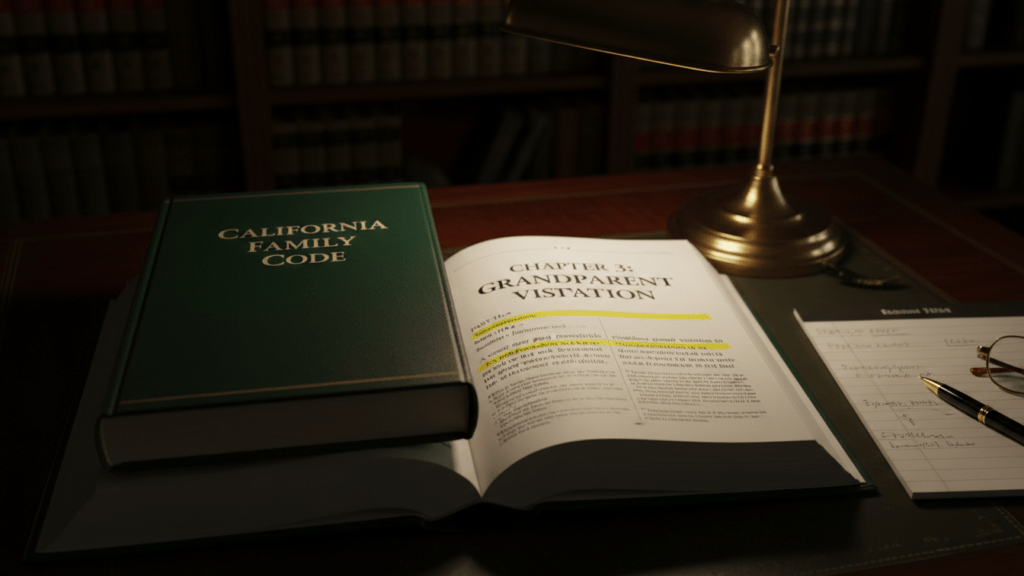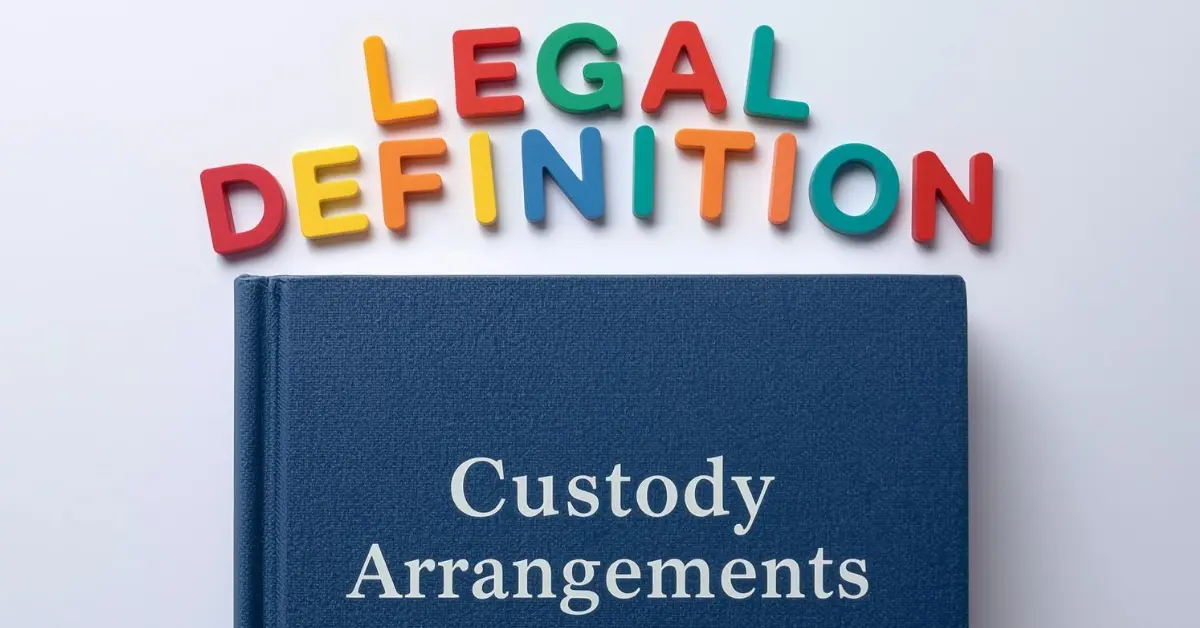
Family conflict, divorce, or the death of a parent can suddenly cut grandparents out of a child’s life. Many grandparents assume that their long-standing relationship gives them an automatic legal right to stay involved—but that is not how the law works. In California, grandparent visitation exists, but it is carefully limited to protect parental rights.
This guide explains when grandparents can legally request visitation, what courts actually look for, and why many cases are denied—even when the emotional bond is strong. Everything here is written to answer the questions grandparents and parents are actively searching for.
Key Truths About Grandparent Visitation in California
- Visitation is allowed, but never automatic
- Parents’ rights carry heavy legal weight
- Emotional bonds must be proven, not assumed
- Courts focus on child impact—not fairness to adults
- Every case depends on specific facts
Table of Contents
Grandparent Visitation in California: The Legal Starting Point

California law allows grandparents to ask the court for visitation, but it does not guarantee that visitation will be granted.
Courts must balance two important principles:
- A child’s best interests
- A parent’s fundamental right to decide who has access to their child
Because parents have constitutional rights, courts begin with the assumption that a fit parent’s decision is correct. This presumption is difficult—but not impossible—for grandparents to overcome.
When Can a Grandparent File for Visitation in California?
A grandparent cannot request visitation at any time. California law allows petitions only in specific situations, including:
- The child’s parents are divorced or legally separated
- One parent is deceased
- One parent has been missing for an extended period
- The parents are not married and do not live together
- A stepparent adoption has occurred (with limits)
If the parents are married, living together, and agree that visitation should not occur, courts will almost always deny the request.
What a Grandparent Must Prove to the Court
To succeed in a grandparent visitation case, the grandparent must prove both of the following:
1. A Pre-Existing Relationship With the Child
The grandparent must show an established bond—something meaningful and ongoing, not occasional visits or holiday contact.
Courts may look at:
- Regular caregiving or babysitting
- Emotional reliance by the child
- Length and consistency of contact
- The role the grandparent plays in daily life
2. That Visitation Is in the Child’s Best Interests
The court must believe that continued contact benefits the child, not the grandparent.
If denying visitation would cause emotional harm to the child, that strengthens the case—but harm must be real and specific, not assumed.
Why Parental Objections Matter So Much
If both parents object to visitation, California courts apply a strong legal presumption that their decision is in the child’s best interests.
To overcome this presumption, a grandparent must present clear evidence that:
- The relationship is significant, and
- Ending it would harm the child emotionally or psychologically
Disagreement, family conflict, or hurt feelings are not enough.
Can Grandparents Ever Seek Custody in California?
Yes, but custody is far more difficult than visitation.
A court will consider granting custody to a grandparent only if:
- The parents are unfit, or
- Remaining with the parents would be harmful to the child
Custody cases often involve:
- Abuse or neglect
- Substance abuse
- Abandonment
- Long-term inability to parent
Custody is about protection—not preference.
Parental Unfitness: What Courts Actually Consider
In California, declaring a parent “unfit” is serious and rare. Courts do not remove parental authority simply because a grandparent disagrees with parenting choices or believes they could do better. The legal standard is high because parents have a constitutional right to raise their children.
For grandparents seeking visitation or custody, understanding what courts really consider unfitness can prevent false hopes and wasted legal effort.
What Parental Unfitness Does (and Does Not) Mean
Parental unfitness means that a parent’s behaviour or condition puts the child’s physical or emotional well-being at risk.
It does not mean:
- Strict parenting
- Different values
- Limited contact with grandparents
- Parenting styles grandparents dislike
Courts focus on harm, not family conflict.
Key Factors California Courts Examine
California judges look at patterns of behaviour, not isolated mistakes. Evidence must show an ongoing inability or unwillingness to safely parent.
Below are the most common factors courts evaluate.
1. Abuse or Risk of Harm to the Child
This is the most serious and clear ground for unfitness.
Courts may find unfitness if there is evidence of:
- Physical abuse
- Sexual abuse
- Severe emotional abuse
- Allowing another person to harm the child
Evidence may include:
- Police or CPS reports
- Medical records
- Court findings from prior cases
Allegations alone are not enough—proof matters.
2. Chronic Neglect or Failure to Provide Care
Neglect goes beyond financial hardship. Courts look at whether a parent consistently fails to meet basic needs, such as:
- Food and nutrition
- Safe housing
- Medical care
- Supervision appropriate for the child’s age
A single missed appointment is not neglect. A pattern of indifference is.
3. Substance Abuse That Affects Parenting
Drug or alcohol use becomes relevant only when it interferes with parenting ability.
Courts consider:
- DUI convictions involving the child
- Drug exposure in the home
- Repeated relapses without treatment
- Substance abuse tied to neglect or unsafe behaviour
Casual or past use alone is usually insufficient.
4. Severe Mental Health Conditions
Mental illness does not automatically make a parent unfit.
Courts examine:
- Whether the condition is untreated
- Whether it affects judgment or stability
- Whether it interferes with daily caregiving
- Whether the parent refuses treatment
A diagnosed condition managed with treatment rarely supports unfitness.
5. Abandonment or Extended Absence
A parent may be found unfit if they:
- Leave the child for long periods without contact
- Fail to provide emotional or financial support
- Show no effort to maintain a relationship
Courts consider intent—temporary absence due to hardship is not abandonment.
What Happens If One Parent Supports Grandparent Visitation?
If one parent supports visitation and the other objects, the court may be more open to hearing the case.
However, the grandparent must still show:
- A meaningful existing relationship
- That visitation benefits the child
Support from a parent helps—but it does not guarantee success.
Stepparent Adoption and Grandparent Visitation
Stepparent adoption usually terminates grandparent visitation rights.
However, California allows limited exceptions when:
- One biological parent has died, and
- The court finds visitation serves the child’s best interests
These cases are highly fact-specific.
What Judges Focus On Most in Visitation Cases
Judges commonly evaluate:
- The emotional bond between child and grandparent
- The child’s age and emotional maturity
- How visitation would affect family stability
- The reasons parents oppose visitation
- Whether visitation would disrupt parenting authority
Courts aim to protect children from conflict—not create more.
Read the law: Burak v. Burak, 455 Md. 564 (Court of Appeals 2017)
Common Reasons Grandparent Visitation Requests Are Denied
Most petitions fail because:
- Parents are married and united in opposition
- The grandparent cannot prove a strong bond
- The request interferes with parental decision-making
- There is no evidence of harm to the child
Understanding these limits early prevents unnecessary legal battles.
Further readings you may need
Moving-vs-non-moving-infractions
Reference:
California Family Law Practice and Procedure (Volumes 1–4) – Comprehensive practitioner’s treatise covering custody and visitation rights under California law, including third-party rights such as grandparents.
California Family Law: A Practice Focused Casebook (3rd Edition) by John E. B. Myers – A detailed California family law casebook with in-depth coverage of child custody and visitation issues in state practice.
California Family Law Practice, 2025-1 Edition (CFLR) – Updated loose-leaf family law reference including summaries of California decisions relevant to child custody and visitation.
California Child Custody Litigation and Practice – Practical guide for custody and visitation litigation in California, including disputes involving third parties like grandparents.
Family Law in a Nutshell (9th Edition) by John E. B. Myers – A concise overview of family law principles including custody and visitation that helps explain the legal context for grandparent rights.
Grandparents’ Visitation Rights (Classic Reprint) – A standalone book treating the historical and legal issues of grandparents’ rights in visitation cases.
Grandparents’ Visitation Rights and Custody by Ann M. Stanton, JD, PhD – An academic analysis of visitation statutes and their implications for family structure and child welfare.
Kids and the Law: An A-to-Z Guide for Parents by Thomas A. Nazario – A family-law guide that explains basic custody and visitation rights, including aspects relevant in California.
Family Privacy and the Custody and Visitation Rights of Adult Outsiders (Symposium Article Collection) – Though academic, this collection of essays examines how courts treat non-parent visitation rights and the legal standards applied.
Child Custody and Domestic Violence: A Call for Safety and Accountability (Sage Academic) – Important for understanding how custody and visitation decisions (including third-party requests) intersect with issues of safety and best interests.
WRAP UP
California recognises that grandparents can play a meaningful role in a child’s life—but the law prioritises parental authority and family stability. Grandparent visitation succeeds only when it clearly supports the child’s emotional health without undermining a parent’s rights.
Before filing a case, understanding these legal realities helps families make informed, child-focused decisions—whether inside or outside the courtroom.




